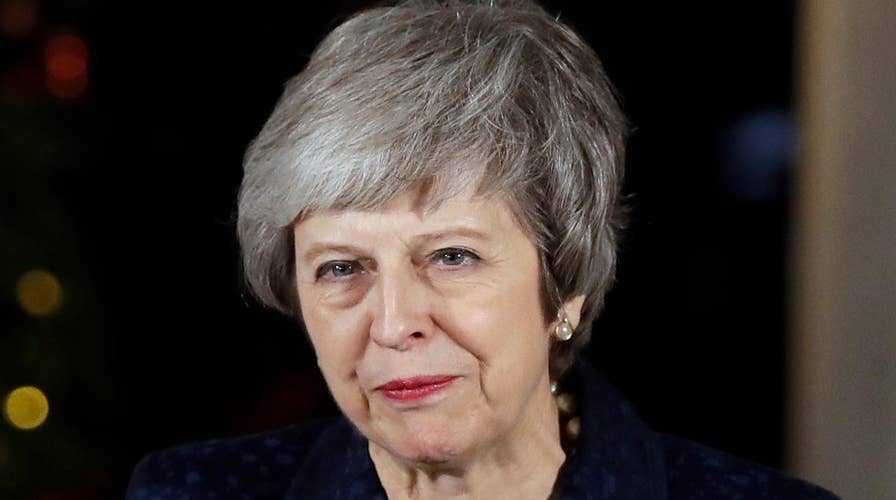U.K. Prime Minister Theresa May survived a vote of confidence in her leadership of her party Wednesday, but not until after a bruising challenge in which she reportedly promised she would step down before the next general election.
A leadership vote had been triggered after 48 Conservative Party MPs had written letters expressing no confidence in her leadership -- 15 percent of the party’s members in the Commons.
But the vote of confidence of the broader bloc of Tory MPs went in her favor -- with 200 MPs backing her leadership and 117 voting against her.
The victory means not only that May holds onto power, but also that now she cannot be formally challenged by her own party for a year. However, it also means that a third of her party voted against her, a factor that may only increase calls for her to step down in the coming months.
During brief remarks outside 10 Downing Street Wednesday night, May said she was "grateful" that a majority of parliamentary Conservatives had backed her but noted that "a significant number of colleagues did cast a vote against me and I've listened to what they've said."
The prime minister added that her government's "renewed mission" was "delivering the Brexit that people voted for, bringing the country back together and building a country that truly works for everyone."
May had faced furious criticism from members of her own party for her handling of Britain’s departure from the European Union -- from which the U.K. is set to depart in March. A number of Cabinet members, including then-Foreign Secretary Boris Johnson and two Brexit secretaries, have resigned this year over her handling of the negotiations.
Conservative MP Jacob Rees-Mogg, a key Brexiteer, says the result showed May did not have the support of Tory backbenchers -- and was a "very bad" result for May.
"I think the prime minister should resign, she cannot get her deal through, her very bad, unsatisfactory withdrawal agreement... and having failed in her main plank of policy, it would be constitutionally normal for her to retire from the fray," he said Wednesday evening on Sky News.
"Her chancellor [Philip Hammond] said this morning that people voting against her are extremists. That means she's got 117 extremists in her party," he said. "That's not a great position for her to be in, is it?"
The Times of London reported ahead of the vote that May told Tories that she would not fight the next election, currently scheduled to be held in 2022. This appeared to be a concession to her critics, and indicated she may step down after the U.K. begins its departure from the E.U. in March.
However, she had told reporters ahead of the vote on Wednesday that she would “contest that vote with everything I’ve got.” She also warned members of her party that voting her out could lead to no Brexit and hand power to the opposition Labour Party.
SPAIN AGREES TO BACK BREXIT DEAL AFTER SECURING CONCESSIONS FROM BRITAIN, EU
May became prime minister in 2016 after winning a leadership race after the resignation of former Prime Minister David Cameron in the wake of the Brexit referendum. May, who supported the campaign for Britain to remain in the E.U., has seen her time in office overshadowed by the question of Brexit as she has sought to keep her own party happy while also negotiating a deal with European leaders.
A vote on the deal she negotiated with Brussels was shelved this week as she admitted she did not have the votes to get the deal through Parliament, leading to lawmakers from all sides ramping up its criticism of May’s handling of Brexit.
Brexiteers, in particular, have complained that a “backstop” agreement on the Irish border included in the deal -- to avoid a “hard border” between Ireland and Northern Ireland -- means that her deal would keep Britain tied to a customs union with the E.U. if no trade deal can be made.
There are fears that, without a clear mechanism to withdraw from that backstop by itself, Britain would be left in a “Hotel California” Brexit -- a reference to The Eagles song that describes a hotel from which you can check out, but never leave.
Even though May survived the vote, she still has some daunting months ahead. It is far from clear, whenever the vote on the divorce deal takes place, whether it will pass.
Labour leader Jeremy Corbyn tweeted Wednesday evening that the result of the no-confidence vote "changes nothing."
"Theresa May has lost her majority in Parliament, her Government is in chaos and she's unable to deliver a Brexit deal that works for the country and puts jobs and the economy first," he added. "She must now bring her botched deal back to Parliament [for a vote] next week."
If a so-called "meaningful vote" fails to pass the Brexit deal through the House of Commons, pressure would ramp up on May to call a general election and resign. Some pro-Remain figures also have called for a second referendum, this time on the Brexit deal itself. May so far has ruled out such a vote.
Fox News' Samuel Chamberlain contributed to this report.






































